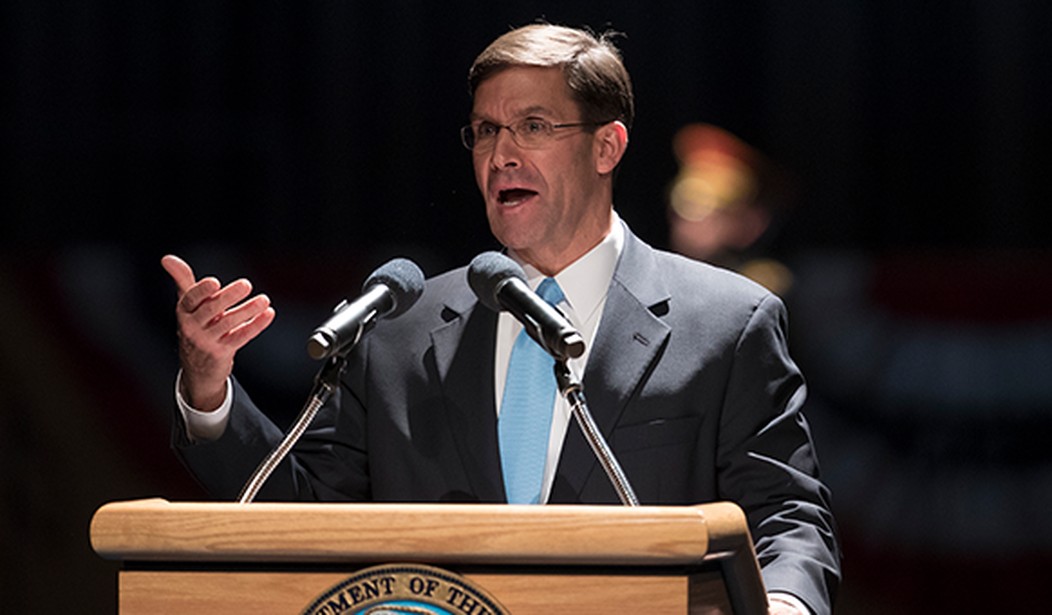Dr. Mark Esper, President Trump's nominee for Secretary of Defense, signaled that he is closely aligned with the views of former Secretary Jim Mattis in a policy area that previously proved to be a point of contention between President Donald Trump and the Pentagon.
During the nominee’s confirmation hearing on Tuesday, Senator Gary Peters (D-MD) asked whether Esper’s views on the U.S. alliance system are “more closely aligned with the views of Secretary Mattis than of Trump.” The defense secretary nominee responded that “I don’t know where to pick between the two...but clearly, I share Mattis’ viewpoint and I’ve expressed that publicly.”
During his tenure, Mattis pushed the United States to nurture U.S. alliances and security partnerships in Europe and Asia, butting heads with the President’s unilateralist “America-First” foreign policy. After over a year of friction with the White House, the former secretary finally resigned from office when the president withdrew troops from Syria without consulting him, leaving Syria’s Kurdish fighters to fend for themselves.
“Because you have the right to have a Secretary of Defense whose views are better aligned with yours on these and other subjects, I believe it is right for me to step down from my position,” Mattis wrote in his resignation letter.
Esper, who is the current secretary of the army, echoed his predecessor’s attachment to the U.S. alliance system during the hearing, asserting that the United States should not only maintain but “expand our networks and alliances” across the world. In particular, Esper said he would work to recruit Indonesia and Vietnam as security partners to “deter bad behavior” by China.
Recommended
“We need to look aggressively where else we can build new relationships,” the nominee said.
Esper’s position may revive conflict between the Pentagon and the president about U.S. alliance commitments if the nominee is confirmed. Mattis often came to loggerheads with Trump over the president’s criticism of NATO, East Asian security guarantees, and troop deployment in the middle east. The defense secretary was also routinely tasked with flying across the world to reassure allies made uneasy by Trump’s rhetoric and policy.
Esper also noted that he, like Mattis, would “absolutely” consider resigning from office if he is ordered to support an issue or policy that would run counter to his values and principles.
“My time in the army, I grew up with this view that if you are asked to do anything that is illegal, amoral or unethical, then that is the point at which you would have to consider resignation,” he told the Senators.
The nominee also emphasized that he would oppose any attempts to politicize the Department of Defense, promising senators to conduct business in a “professional and ethical manner at all times.”
Despite Esper’s assurances, however, several Senators grilled the nominee for his previous role as the chief lobbyist to Raytheon, a weapon manufacturer. Senator Elizabeth Warren (D-MA) in particular raised concerns about Esper’s conflict of interest even before the hearing.
During the hearing, Warren asked Esper whether he would recuse himself from all future decisions that involve his former employer and refrain from returning to lobbying for four years after the end of his tenure. Esper refused both requests, triggering a heated exchange between the senator and the nominee.
“In a recent memo, you detailed an exception to your ethics obligation by writing that you can get a waiver [to consider decisions that] that directly and predictably affect Raytheon’s financial interest if ‘it is so important that it cannot be referred to another official,’” Warren said. “This smacks of corruption, plain and simple.”
Esper replied to the senator that he made his decisions after discussing it with ethics experts in the Pentagon. However, he struggled to mount a rebuttal because the senator repeatedly talked over Esper. Warren was finally gaveled out by the committee chair, giving the nominee time to speak.
“I think the presumption is, for some reason, anybody who comes from the business or the corporate world is corrupt,” Esper lamented.

























Join the conversation as a VIP Member